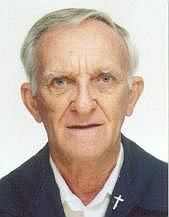Daniel Comboni
Comboni Missionaries
Institutional area
Other links
Newsletter
In Pace Christi
Zen Angelo Carlo
Born at San Zenone degli Ezzelini (Treviso Province) on 15 February, 1923, Angelo Carlo Zen was the seventh of thirteen children. Once he finished his military service he resumed his studies at the diocesan seminary of Treviso. At 25 he entered the Comboni novitiate at Gozzano (Novara) and consecrated himself to the mission by taking first vows in 1950 and perpetual vows in 1955. He was ordained priest on 26 May, 1956, by Archbishop Giovanni Battista Montini, the future Pope Paul VI.
On the occasion of his First Mass in his home town, his mother revealed: “Before getting married, I promised Our Lady I would never eat fruit on Saturdays in order to have a son as a priest. Now that I am the mother of a priest, I shall keep this promise for the rest of my life”.
The following year, Fr. Angelo returned to Rebbio as local bursar where, with his simplicity, availability and cheerfulness, he was outstanding for the way he welcomed elderly confreres.
In 1959, he was sent as spiritual director to the house of formation for Comboni Brothers at Pellegrina. The following year he agreed to go to Troia (Foggia) to help in pastoral work and mission promotion.
In 1960 he was appointed to Brazil. He spent the first stage of his mission at the parish of São Gabriel da Palha, in the north of the state of Espírito Santo, where he devoted himself to the formation of groups and lay associations and catechesis. He also built a church and a modern seminary.
From 1966 to 1968, he was parish priest of São Marcos, at Nova Venécia. He visited the communities of the interior within a radius of 50km, still following traditional pastoral methods but also trying to study and understand the Council documents at the numerous gatherings organised by the diocese of São Mateus.
From 1969 to 1975, Fr. Angelo worked at the parish of Montanha, a town in the interior of the extreme north of Espírito Santo. The parish, which had been run by Combonis since 1957, was building and running structures for social works among which was a hospital for the ecclesial communities of the area. A gymnasium was built for the youth as well as schools for arts and crafts which were financed by the State. This was in line with the new pastoral policies of Vatican II.
Obedient, as always, to the decisions of his superiors, in 1977 Fr. Angelo left Montanha to assume responsibility, together with Fr. Francesco Cioffi, for the parish of Águia Branca. In 1981, after only two years, he was sent to Tangará da Serra, a small town at an altitude of 800m and made up of cattle-raising farms, Km 220 from Cuiabá, to the west of the state of Mato Grosso do Sul.
He was then assigned to the parish of Santa Amelia, in the city of Curitiba, the capital of the state of Paranà, in the south-west of Brazil where there had been a seminary since 1978. Fr. Angelo spent ten years there – from 1984 to 1994.
There, following the indications of the diocese, he worked to develop family ministry and catechesis giving a lot of attention to the Small Christian Communities. During that time he had an accident and was wounded in a leg. He underwent an operation but it was not a success and left him with a limp.
At almost 73 years of age, he left the parish of Curitiba, to take up his post at São José do Rio Preto where he accepted the job of parish priest of Christ the King. He ministered there for many years until, due to his age and physical weakness and difficulty in walking, he left the parish leadership.
He was still very active and enthusiastically learned to use the computer to write and read about things of interest to him and to communicate with friends, confreres and benefactors. Even though he needed a stick to walk, he still worked in the garden every day, taking care of the chickens, the fish in his small aquarium and the canaries. He continued saying Mass for the Groups of Our Lady, the Associations of Mother Teresa of Calcutta, the Vox Dei Group, the supporters of the “Canção Nova” and to work as a chaplain in the city hospital.
His great love was for the homeless to whom, with his constant, smiling and benevolent presence, by means of the Word of God and the Eucharist, he succeeded in giving the hope of a better future and who repaid him with just as much sympathy and affection.
Fr. Angelo was taken to hospital at São José do Rio Preto and died there, after much suffering, on 3 February, 2012.
(Fr. Vincenzo Santangelo)

